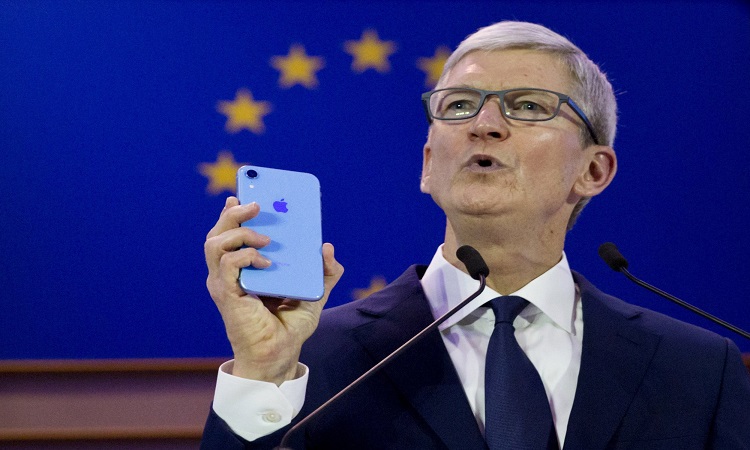Apple CEO Tim Cook supports stricter data privacy laws, warns of ‘data industrial complex’

Apple CEO Tim Cook holds up an iPhone as he speaks during a data privacy conference at the European Parliament in Brussels, Wednesday, Oct. 24, 2018. (AP Photo/Virginia Mayo)
The U.S. should follow the EU’s lead because, Cook said, “These scraps of data…each one harmless enough on its own…are carefully assembled, synthesized, traded, and sold.”
Cook and Apple have sought to differentiate the iPhone maker’s approach from that of other tech giants such as Google and Facebook, which rely on revenue from ads based on user data. The company last week unveiled a new privacy portal giving Apple users a way to see what data the company collects on them and the ability to delete if, if they wish. Users in Europe had access to those features upon GDPR’s enaction.
Facebook CEO Mark Zuckerberg and Google head Sundar Pichai also both said they supported regulation in brief video remarks to the conference with Pichai noting Google recently proposed a legislative framework that would build on GDPR and extend many of its principles to users globally.
Zuckerberg said Facebook takes seriously its “basic ethical responsibility” to safeguard personal information but added that “the past year has shown we have a lot more work to do,” referring to a big data breach and the scandal over the misuse of data by political consultancy Cambridge Analytica.
In the U.S., California is moving to put in regulations similar to the EU’s strict rules by 2020 and other states are mulling more aggressive laws. That’s rattled the big tech companies, which are pushing for a federal law that would treat them more leniently.
During his speech, Cook complimented the EU for passing GDPR. “Fortunately, this year, you’ve shown the world that good policy and political will can come together to protect the rights of everyone,” he said. “We also celebrate the new steps taken, not only here in Europe, but around the world. In Singapore, Japan, Brazil, New Zealand, and many more nations, regulators are asking tough questions and crafting effective reforms.”
The U.S. should have a “comprehensive federal privacy law” with four essential rights, Cook said. “First, the right to have personal data minimized. Companies should challenge themselves to de-identify customer data – or not to collect it in the first place. Second, the right to knowledge. Users should always know what data is being collected and what it is being collected for,” he said. “Third, the right to access. Companies should recognize that data belongs to users, and we should all make it easy for users to get a copy of…correct…and delete their personal data. And fourth, the right to security. Security is foundational to trust and all other privacy rights.”
Apple is “optimistic about technology’s awesome potential for good,” Cook said. “But we know that it won’t happen on its own. Every day, we work to infuse the devices we make with the humanity that makes us. As I’ve said before, ‘Technology is capable of doing great things. But it doesn’t want to do great things. It doesn’t want anything. That part takes all of us,'” he said.






